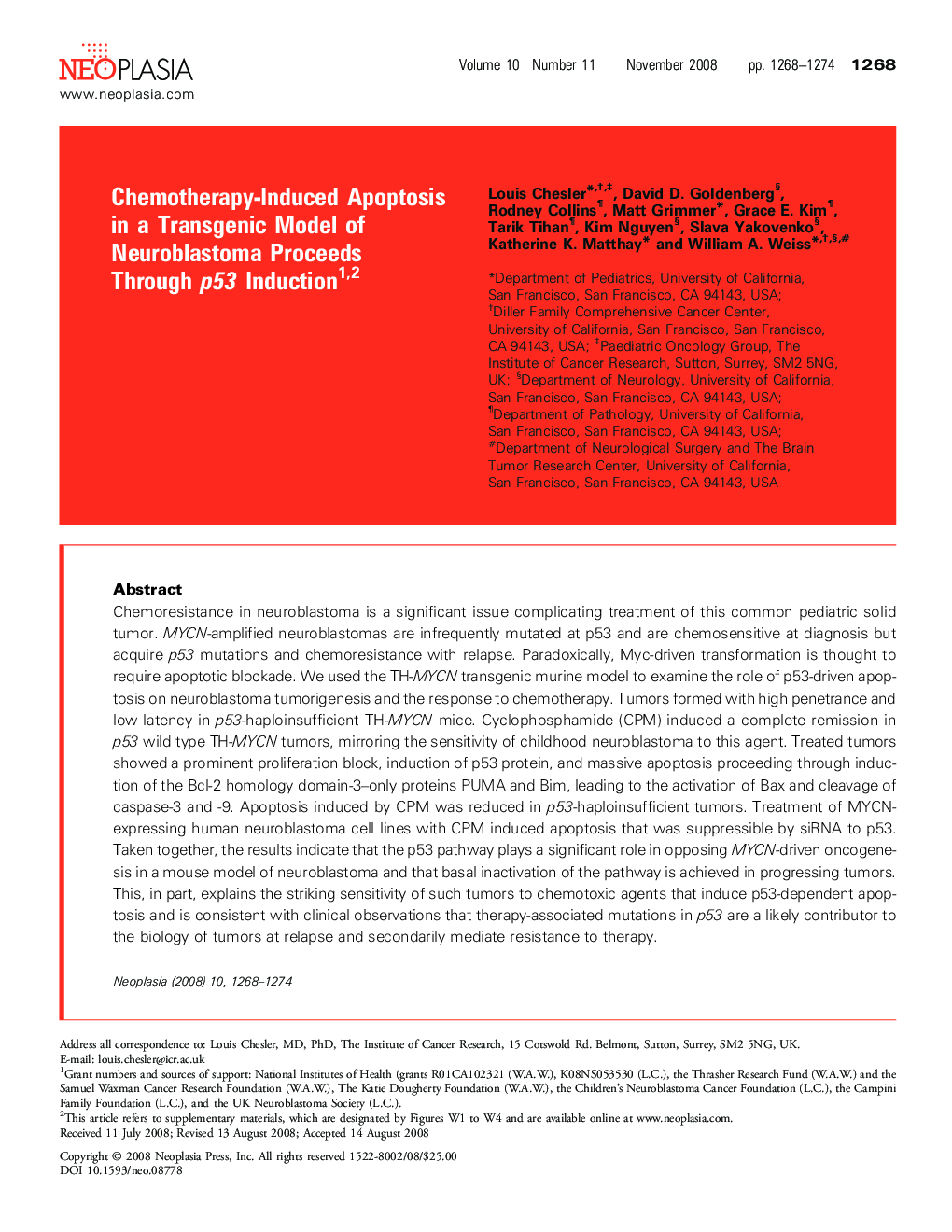| کد مقاله | کد نشریه | سال انتشار | مقاله انگلیسی | نسخه تمام متن |
|---|---|---|---|---|
| 2152051 | 1090041 | 2008 | 9 صفحه PDF | دانلود رایگان |
عنوان انگلیسی مقاله ISI
Chemotherapy-Induced Apoptosis in a Transgenic Model of Neuroblastoma Proceeds Through p53 Induction
دانلود مقاله + سفارش ترجمه
دانلود مقاله ISI انگلیسی
رایگان برای ایرانیان
موضوعات مرتبط
علوم زیستی و بیوفناوری
بیوشیمی، ژنتیک و زیست شناسی مولکولی
تحقیقات سرطان
پیش نمایش صفحه اول مقاله

چکیده انگلیسی
Chemoresistance in neuroblastoma is a significant issue complicating treatment of this common pediatric solid tumor. MYCN-amplified neuroblastomas are infrequently mutated at p53 and are chemosensitive at diagnosis but acquire p53 mutations and chemoresistance with relapse. Paradoxically, Myc-driven transformation is thought to require apoptotic blockade. We used the TH-MYCN transgenic murine model to examine the role of p53-driven apoptosis on neuroblastoma tumorigenesis and the response to chemotherapy. Tumors formed with high penetrance and low latency in p53-haploinsufficient TH-MYCN mice. Cyclophosphamide (CPM) induced a complete remission in p53 wild type TH-MYCN tumors, mirroring the sensitivity of childhood neuroblastoma to this agent. Treated tumors showed a prominent proliferation block, induction of p53 protein, and massive apoptosis proceeding through induction of the Bcl-2 homology domain-3-only proteins PUMA and Bim, leading to the activation of Bax and cleavage of caspase-3 and -9. Apoptosis induced by CPM was reduced in p53-haploinsufficient tumors. Treatment of MYCN-expressing human neuroblastoma cell lines with CPM induced apoptosis that was suppressible by siRNA to p53. Taken together, the results indicate that the p53 pathway plays a significant role in opposing MYCN-driven oncogenesis in a mouse model of neuroblastoma and that basal inactivation of the pathway is achieved in progressing tumors. This, in part, explains the striking sensitivity of such tumors to chemotoxic agents that induce p53-dependent apoptosis and is consistent with clinical observations that therapy-associated mutations in p53 are a likely contributor to the biology of tumors at relapse and secondarily mediate resistance to therapy.
ناشر
Database: Elsevier - ScienceDirect (ساینس دایرکت)
Journal: Neoplasia - Volume 10, Issue 11, November 2008, Pages 1268-1274, IN33-IN34
Journal: Neoplasia - Volume 10, Issue 11, November 2008, Pages 1268-1274, IN33-IN34
نویسندگان
Louis Chesler, David D. Goldenberg, Rodney Collins, Matt Grimmer, Grace E. Kim, Tarik Tihan, Kim Nguyen, Slava Yakovenko, Katherine K. Matthay, William A. Weiss,